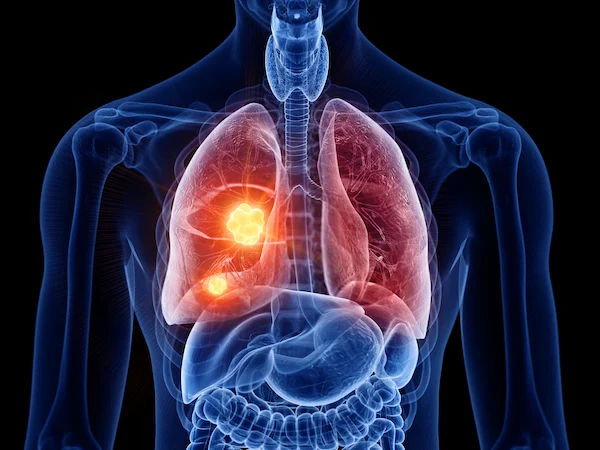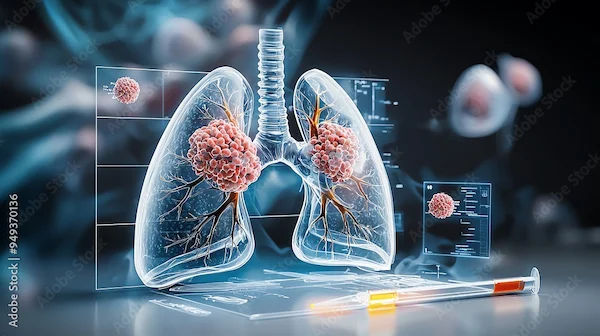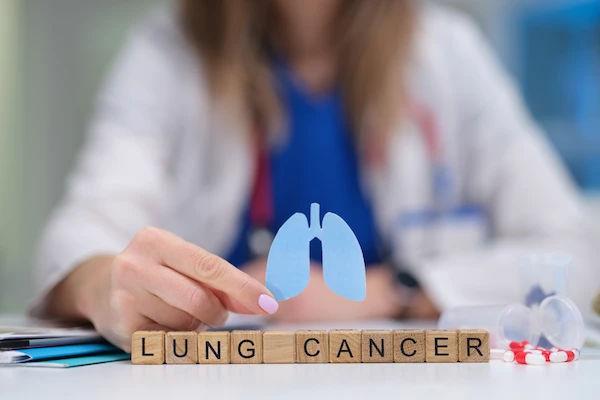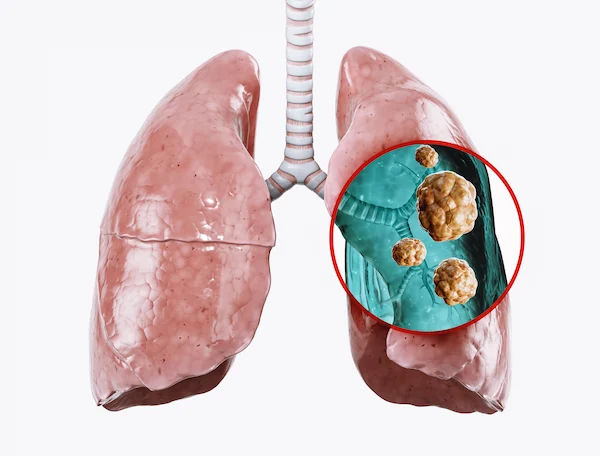Four Types of Lung Cancer Explained
Learn about the four main types of lung cancer; NSCLC, SCLC, lung carcinoid tumours, and mesothelioma—including their symptoms, causes, and treatment options.

Written by Dr. J T Hema Pratima
Reviewed by Dr. Rohinipriyanka Pondugula MBBS
Last updated on 22nd Aug, 2025

Lung cancer is one of the most common cancers worldwide, affecting millions of people every year. Understanding the different types of lung cancer can help patients and their loved ones make informed decisions about diagnosis and treatment.
In this article, we’ll break down the four main types of lung cancer, their symptoms, causes, and how they affect health. We’ll also share some helpful tips for managing the condition and improving quality of life.
1. Non-Small Cell Lung Cancer (NSCLC)
What is NSCLC?
Non-small cell lung cancer (NSCLC) is the most common type, accounting for about 80-85% of all lung cancer cases. It grows more slowly than small cell lung cancer and has three main subtypes:
- Adenocarcinoma – Starts in mucus-producing cells, often found in the outer parts of the lungs.
- Squamous Cell Carcinoma – Develops in the lining of the airways, usually in the central part of the lungs.
- Large Cell Carcinoma – A fast-growing type that can appear anywhere in the lungs.
Symptoms of NSCLC
- Persistent cough
- Chest pain
- Shortness of breath
- Coughing up blood
- Unexplained weight loss
Causes & Risk Factors
- Smoking (primary cause)
- Exposure to secondhand smoke
- Air pollution or asbestos
- Family history of lung cancer
How It Affects Health
- NSCLC can spread to other organs if not detected early. However, early-stage NSCLC is often treatable with surgery, chemotherapy, or targeted therapy.
2. Small Cell Lung Cancer (SCLC)
What is SCLC?
- Small cell lung cancer (SCLC) is less common but more aggressive, making up about 10-15% of lung cancer cases. It spreads quickly and is strongly linked to smoking.
Symptoms of SCLC
- Persistent cough
- Fatigue
- Loss of appetite
- Wheezing
- Swelling in the face
Causes & Risk Factors
- Heavy smoking (major risk)
- Exposure to radon gas
- Occupational hazards (like asbestos)
How It Affects Health
- SCLC grows rapidly and often spreads to the brain, liver, or bones before diagnosis. Treatment usually involves chemotherapy and radiation, as surgery is rarely an option.
3. Lung Carcinoid Tumours
What Are Lung Carcinoid Tumours?
- These are rare, slow-growing tumours that account for less than 5% of lung cancers. They arise from neuroendocrine cells and are usually less aggressive.
Symptoms
- Wheezing
- Flushing (redness of the skin)
- Diarrhea
- Shortness of breath
Causes & Risk Factors
- Genetic factors
- Not strongly linked to smoking
How It Affects Health
- Most carcinoid tumours grow slowly and can be treated with surgery if detected early. Some may produce hormones, causing additional symptoms.
4. Mesothelioma (A Rare Type Linked to Asbestos)
What is Mesothelioma?
- Mesothelioma is a rare but aggressive cancer affecting the lining of the lungs (pleura). It is strongly linked to asbestos exposure.
Consult a Top General Practitioner for the best advice
Symptoms
- Chest pain
- Difficulty breathing
- Fluid buildup in the lungs
- Unexplained weight loss
Causes & Risk Factors
Asbestos exposure (main cause)
Occupational hazards (construction, shipbuilding)
How It Affects Health
- Mesothelioma has a poor prognosis due to late detection. Treatment includes surgery, chemotherapy, and immunotherapy.
Tips for Managing Lung Cancer
1. Quit Smoking – The best way to reduce risk and improve treatment outcomes.
2. Healthy Diet – Eat antioxidant-rich foods (fruits, vegetables) to support immunity.
3. Regular Exercise – Helps maintain strength and reduce fatigue.
4. Follow-Up Care – Regular check-ups are crucial for monitoring progress.
5. Emotional Support – Counselling or support groups can help cope with the diagnosis.
When to See a Doctor?
If you experience persistent symptoms like a chronic cough, chest pain, or unexplained weight loss, consult a doctor immediately. Early detection greatly improves treatment success.
Need Help? Book a Consultation Today!
If you or a loved one has concerns about lung health, Apollo 24|7 offers expert consultations and diagnostic tests. Early detection saves lives; schedule an appointment today!
Final Thoughts
Lung cancer can be overwhelming, but understanding its types and symptoms empowers patients to take action. With advancements in treatment, many people live fulfilling lives after diagnosis. Stay informed, seek medical advice, and prioritise a healthy lifestyle.
Would you like to learn more about lung cancer screenings? Talk to an Apollo specialist now!
Consult a Top General Practitioner for the best advice
Consult a Top General Practitioner for the best advice
Dr. Gaddam Manoj
General Practitioner
1 Years • MBBS
Hyderabad
Aaradhya clinic, Hyderabad

Dr Suseela
General Physician
5 Years • MBBS
Bengaluru
Apollo Medical Center, Marathahalli, Bengaluru
Dr. Sahana B
General Practitioner
3 Years • MBBS
Koppal
Khushi multi-speciality hospital, Koppal

Dr. Mainak Baksi
General Practitioner
13 Years • MBBS , MD (MPH)
Howrah
Mainak Baksi Clinic, Howrah
(50+ Patients)

Dr. Rajib Ghose
General Practitioner
25 Years • MBBS
East Midnapore
VIVEKANANDA SEBA SADAN, East Midnapore
Consult a Top General Practitioner for the best advice
Dr. Gaddam Manoj
General Practitioner
1 Years • MBBS
Hyderabad
Aaradhya clinic, Hyderabad

Dr Suseela
General Physician
5 Years • MBBS
Bengaluru
Apollo Medical Center, Marathahalli, Bengaluru
Dr. Sahana B
General Practitioner
3 Years • MBBS
Koppal
Khushi multi-speciality hospital, Koppal

Dr. Mainak Baksi
General Practitioner
13 Years • MBBS , MD (MPH)
Howrah
Mainak Baksi Clinic, Howrah
(50+ Patients)

Dr. Rajib Ghose
General Practitioner
25 Years • MBBS
East Midnapore
VIVEKANANDA SEBA SADAN, East Midnapore




